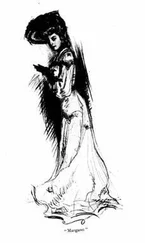James Cabell - Domnei. A Comedy of Woman-Worship
Здесь есть возможность читать онлайн «James Cabell - Domnei. A Comedy of Woman-Worship» весь текст электронной книги совершенно бесплатно (целиком полную версию без сокращений). В некоторых случаях можно слушать аудио, скачать через торрент в формате fb2 и присутствует краткое содержание. Жанр: Фэнтези, на английском языке. Описание произведения, (предисловие) а так же отзывы посетителей доступны на портале библиотеки ЛибКат.
- Название:Domnei. A Comedy of Woman-Worship
- Автор:
- Жанр:
- Год:неизвестен
- ISBN:нет данных
- Рейтинг книги:5 / 5. Голосов: 1
-
Избранное:Добавить в избранное
- Отзывы:
-
Ваша оценка:
- 100
- 1
- 2
- 3
- 4
- 5
Domnei. A Comedy of Woman-Worship: краткое содержание, описание и аннотация
Предлагаем к чтению аннотацию, описание, краткое содержание или предисловие (зависит от того, что написал сам автор книги «Domnei. A Comedy of Woman-Worship»). Если вы не нашли необходимую информацию о книге — напишите в комментариях, мы постараемся отыскать её.
Domnei. A Comedy of Woman-Worship — читать онлайн бесплатно полную книгу (весь текст) целиком
Ниже представлен текст книги, разбитый по страницам. Система сохранения места последней прочитанной страницы, позволяет с удобством читать онлайн бесплатно книгу «Domnei. A Comedy of Woman-Worship», без необходимости каждый раз заново искать на чём Вы остановились. Поставьте закладку, и сможете в любой момент перейти на страницу, на которой закончили чтение.
Интервал:
Закладка:
Now, dazzled, he saw Melicent for the first time….
I think he saw the lines already forming in her face, and knew that, but for him, this woman, naked now of gear and friends, had been to-night a queen among her own acclaiming people. I think he worshipped where he did not dare to love, as every man cannot but do when starkly fronted by the divine and stupendous unreason of a woman's choice, among so many other men, of him. And yet, I think that Perion recalled what Ayrart de Montors had said of women and their love, so long ago:— "They are more wise than we; and always they make us better by indomitably believing we are better than in reality a man can ever be."
I think that Perion knew, now, de Montors had been in the right. The pity and mystery and beauty of that world wherein High God had— scornfully?—placed a smug Perion, seemed to the Comte de la Forêt, I think, unbearable. I think a new and finer love smote Perion as a sword strikes.
I think he did not speak because there was no scope for words. I know that he knelt (incurious for once of victory) before this stranger who was not the Melicent whom he had sought so long, and that all consideration of a lost young Melicent departed from him, as mists leave our world when the sun rises.
I think that this was her high hour of triumph.
CAETERA DESUNT
THE AFTERWORD
These lives made out of loves that long since were
Lives wrought as ours of earth and burning air,
Was such not theirs, the twain I take, and give
Out of my life to make their dead life live
Some days of mine, and blow my living breath
Between dead lips forgotten even of death?
So many and many of old have given my twain
Love and live song and honey-hearted pain.
Thus, rather suddenly, ends our knowledge of the love-business between Perion and Melicent. For at this point, as abruptly as it began, the one existing chronicle of their adventures makes conclusion, like a bit of interrupted music, and thereby affords conjecture no inconsiderable bounds wherein to exercise itself. Yet, in view of the fact that deductions as to what befell these lovers afterward can at best result in free-handed theorising, it seems more profitable in this place to speak very briefly of the fragmentary Roman de Lusignan , since the history of Melicent and Perion as set forth in this book makes no pretensions to be more than a rendering into English of this manuscript, with slight additions from the earliest known printed version of 1546.
2
M. Verville, in his monograph on Nicolas de Caen,[1: Paul Verville, Notice sur la vie de Nicolas de Caen , p. 112 (Rouen, 1911)] considers it probable that the Roman de Lusignan was printed in Bruges by Colard Mansion at about the same time Mansion published the Dizain des Reines . This is possible; but until a copy of the book is discovered, our sole authority for the romance must continue to be the fragmentary MS. No. 503 in the Allonbian Collection.
Among the innumerable manuscripts in the British Museum there is perhaps none which opens a wider field for guesswork. In its entirety the Roman de Lusignan was, if appearances are to be trusted, a leisured and ambitious handling of the Melusina legend; but in the preserved portion Melusina figures hardly at all. We have merely the final chapters of what would seem to have been the first half, or perhaps the first third, of the complete narrative; so that this manuscript account of Melusina's beguilements breaks off, fantastically, at a period by many years anterior to a date which those better known versions of Jean d'Arras and Thuring von Ringoltingen select as the only appropriate starting-point.
By means of a few elisions, however, the episodic story of Melicent and of the men who loved Melicent has been disembedded from what survives of the main narrative. This episode may reasonably be considered as complete in itself, in spite of its precipitous commencement; we are not told anything very definite concerning Perion's earlier relations with Melusina, it is true, but then they are hardly of any especial importance. And speculations as to the tale's perplexing chronology, or as to the curious treatment of the Ahasuerus legend, wherein Nicolas so strikingly differs from his precursors, Matthew Paris and Philippe Mouskes, or as to the probable course of latter incidents in the romance (which must almost inevitably have reached its climax in the foundation of the house of Lusignan by Perion's son Raymondin and Melusina) are more profitably left to M. Verville's ingenuity.
3
One feature, though, of this romance demands particular comment. The happenings of the Melicent-episode pivot remarkably upon domnei —upon chivalric love, upon the Frowendienst of the minnesingers, or upon "woman-worship," as we might bunglingly translate a word for which in English there is no precisely equivalent synonym. Therefore this English version of the Melicent-episode has been called Domnei , at whatever price of unintelligibility.
For there is really no other word or combination of words which seems quite to sum up, or even indicate this precise attitude toward life. Domnei was less a preference for one especial woman than a code of philosophy. "The complication of opinions and ideas, of affections and habits," writes Charles Claude Fauriel,[1: Histoire de la littérature provençale , p. 330 (Adler's translation, New York, 1860)] "which prompted the chevalier to devote himself to the service of a lady, and by which he strove to prove to her his love and to merit hers in return, was expressed by the single word domnei ."
And this, of course, is true enough. Yet domnei was even more than a complication of opinions and affections and habits: it was also a malady and a religion quite incommunicably blended.
Thus you will find that Dante—to cite only the most readily accessible of mediaeval amorists—enlarges as to domnei in both these last-named aspects impartially. Domnei suspends all his senses save that of sight, makes him turn pale, causes tremors in his left side, and sends him to bed "like a little beaten child, in tears"; throughout you have the manifestations of domnei described in terms befitting the symptoms of a physical disease: but as concerns the other aspect, Dante never wearies of reiterating that it is domnei which has turned his thoughts toward God; and with terrible sincerity he beholds in Beatrice de'Bardi the highest illumination which Divine Grace may permit to humankind. "This is no woman; rather it is one of heaven's most radiant angels," he says with terrible sincerity.
With terrible sincerity, let it be repeated: for the service of domnei was never, as some would affect to interpret it, a modish and ordered affectation; the histories of Peire de Maënzac, of Guillaume de Caibestaing, of Geoffrey Rudel, of Ulrich von Liechtenstein, of the Monk of Pucibot, of Pons de Capdueilh, and even of Peire Vidal and Guillaume de Balaun, survive to prove it was a serious thing, a stark and life-disposing reality. En cor gentil domnei per mort no passa, as Nicolas himself declares. The service of domnei involved, it in fact invited, anguish; it was a martyrdom whereby the lover was uplifted to saintship and the lady to little less than, if anything less than, godhead. For it was a canon of domnei, it was the very essence of domnei, that the woman one loves is providentially set between her lover's apprehension, and God, as the mobile and vital image and corporeal reminder of heaven, as a quick symbol of beauty and holiness, of purity and perfection. In her the lover views—embodied, apparent to human sense, and even accessible to human enterprise—all qualities of God which can be comprehended by merely human faculties. It is precisely as such an intermediary that Melicent figures toward Perion, and, in a somewhat different degree, toward Ahasuerus—since Ahasuerus is of necessity apart in all things from the run of humanity.
Читать дальшеИнтервал:
Закладка:
Похожие книги на «Domnei. A Comedy of Woman-Worship»
Представляем Вашему вниманию похожие книги на «Domnei. A Comedy of Woman-Worship» списком для выбора. Мы отобрали схожую по названию и смыслу литературу в надежде предоставить читателям больше вариантов отыскать новые, интересные, ещё непрочитанные произведения.
Обсуждение, отзывы о книге «Domnei. A Comedy of Woman-Worship» и просто собственные мнения читателей. Оставьте ваши комментарии, напишите, что Вы думаете о произведении, его смысле или главных героях. Укажите что конкретно понравилось, а что нет, и почему Вы так считаете.



